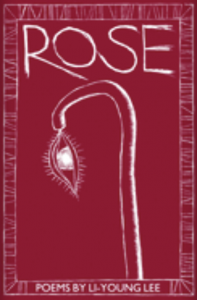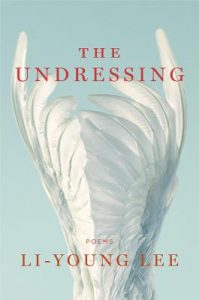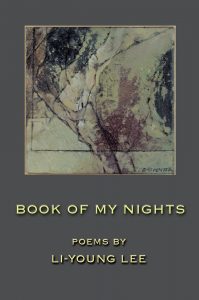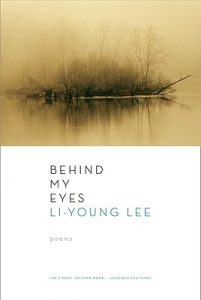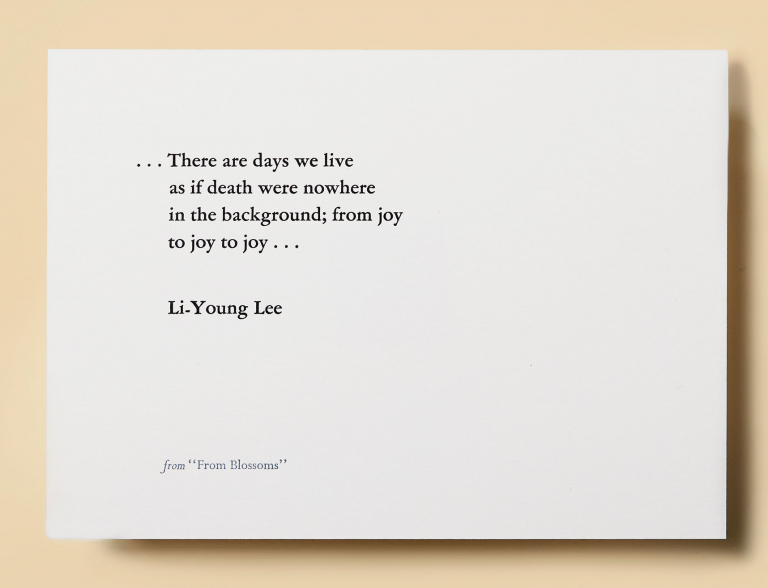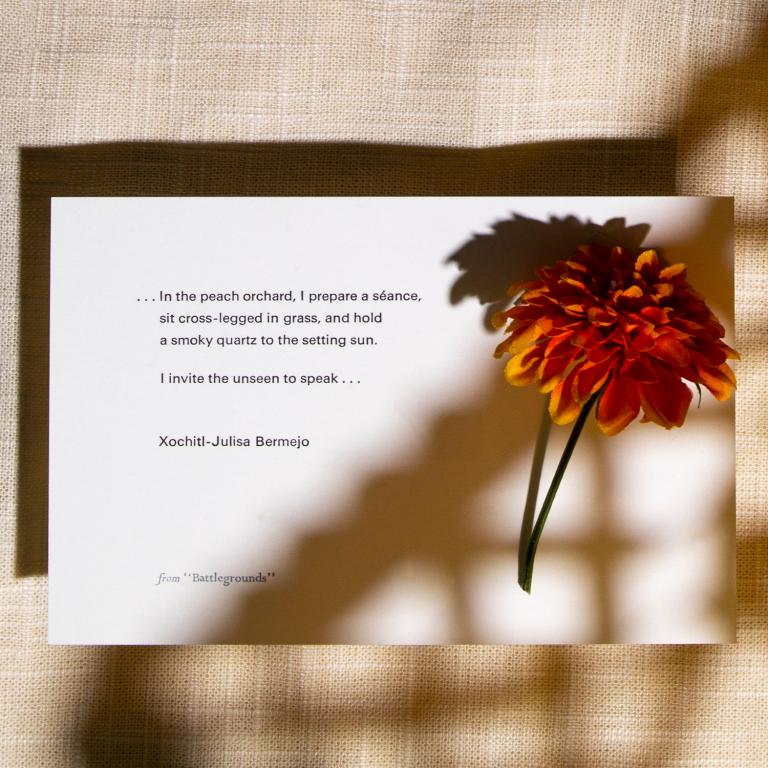Li-Young Lee
From Blossoms
A poem about blossoms that is not only about blossoms. Li-Young Lee remembers a glorious day when he and a companion bought peaches; peaches that had come from blossoms. And in the taste of peaches, the brown paper bag they came in, sold by a boy at a bend in a road, the poem tells us — again and again — that sweetness, yearning and generosity is possible, on all kinds of days.
Letterpress art by Myrna Keliher.
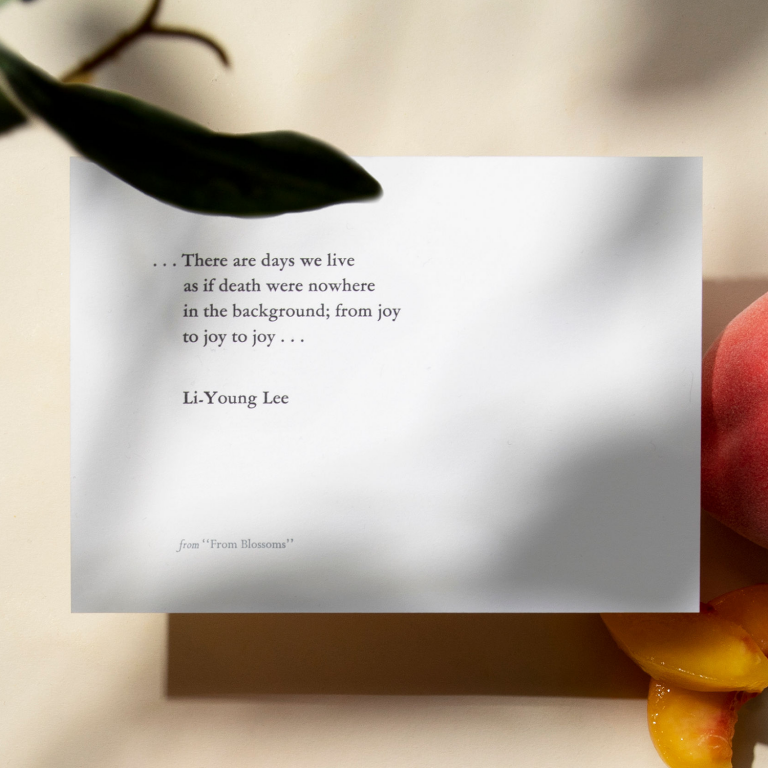
Image by Lucero Torres, © All Rights Reserved.
Guest

Li-Young Lee is the author of five critically acclaimed books of poetry, most recently The Undressing. His earlier books of poetry include Book of My Nights; Behind My Eyes; Rose, winner of the Delmore Schwartz Memorial Award from New York University; and The City in Which I Love You, the 1990 Lamont Poetry Selection.
Transcript
Pádraig Ó Tuama, host: My name is Pádraig Ó Tuama, and one time, while I was leading Corrymeela, I was walking from one building to another. And Corrymeela is right on the north coast of Ireland. And a woman was standing there in the morning light, looking out at the sea. And she came over and she said, “I was supposed to be part of a meeting, but I saw the light, and I realized standing in the light was more important.” And then she said, “My brother died a few months ago, and I never thought I’d ever be happy again.” And she was so caught up in the moment, it was like she was living inside a poem. And I stood with her for a while, smelling the salt in the air, smelling the heather and the blossoms of summer. And I think that, sometimes, an experience we have can be a poem in and of itself.
[music: “Praise the Rain” by Gautam Srikishan]
“From Blossoms” by Li-Young Lee:
“From blossoms comes
this brown paper bag of peaches
we bought from the boy
at the bend in the road where we turned toward
signs painted Peaches.
From laden boughs, from hands,
from sweet fellowship in the bins,
comes nectar at the roadside, succulent
peaches we devour, dusty skin and all,
comes the familiar dust of summer, dust we eat.
O, to take what we love inside,
to carry within us an orchard, to eat
not only the skin, but the shade,
not only the sugar, but the days, to hold
the fruit in our hands, adore it, then bite into
the round jubilance of peach.
There are days we live
as if death were nowhere
in the background; from joy
to joy to joy, from wing to wing,
from blossom to blossom to
impossible blossom, to sweet impossible blossom.”
[music: “The House You Wake In” by Gautam Srikishan]
I have loved the work of Li-Young Lee for years. And I actually began reading him with his most recent books first, and then began to work backwards. And this poem, “From Blossoms,” is in his very first book, a book called Rose. And it’s a book that’s about nature and about loss and about love and sex and sensuality. And it’s a book that, in all of those considerations, sees that language can rise into song. And you see these themes gathered together in the sensual nature of this poem and in the presence of dust, which is kind of like a reminder of death, and then the recognition that something of beauty and of taste and of elegance and of music can elevate you up.
He is a poet who watches and watches and watches. He doesn’t seem to see through; he sees within. And within the peach, he sees the blossom. He sees the people whose hands picked the peaches. He sees the bins in which there was “sweet fellowship” of the peaches before they were doled out. He even sees the dust, and the taste of the dust. And in all of these he manages to, without denying the presence of death, lift up peaches and living into the elegance of song.
[music: “Ashed to Air” by Gautam Srikishan]
You know, sometimes I wonder, what was the idea or the experience that happened that led to this poem being written? And when I think of Li-Young Lee with whoever the other person was — his spouse, I’m guessing, although maybe not, it could’ve been a friend; it could’ve been anyone — when I think of him by the bend in the road, eating that peach and being lifted up by the sweetness of the taste and by the sweetness of the company and by the hand-painted sign, he populates the whole experience with such generosity and truth-telling. Because there’s the blossom from which the peach came. And then there’s the hand, and there’s the hands that picked the peaches and “the boy / at the bend in the road,” and then whoever’s hand painted the sign that says “Peaches.” And dust, also — you think of dry days, when people are working. You think of the shade that they need. We hear of shade, also. He is participating in this whole making of sweetness with everybody who’s laboring around. He is one with them, in this moment of looking into the experience and being full of gratitude, really, for everybody whose hands and work has led to the experience that has meant that he can now enjoy this sweet peach.
[music: “At Dusk” by Gautam Srikishan]
So the amazing thing about this poem is that it is so sensual and gorgeous and almost songlike. At times I think it’s a doxology, a hymn of praise. It’s elevating, and you hear that in the “O” of the opening line of the third stanza, and then you hear it in the repetition, as well. And within all of that, there’s these presences of death and telling the truth about death — not that he’s trying to drag the poem down, but he’s saying that even in a song of sweetness, a song of sweetness can gather in the reality and the truth of death.
And perhaps partly the imagery of that is taking the imagery of a peach blossom being a sign for longevity and life and some kind of immorality. And dust is the opposite of that, I suppose. The careful line that you see in the final stanza, “There are days we live / as if death were nowhere / in the background” — it’s so beautiful. He’s not dragging the poem into sadness, but he’s not denying sadness, either.
It’s at the end of the poem that the death is mentioned. But there’s been these three references to dust, earlier on: “dusty skin and all, / comes the familiar dust of summer, dust we eat.” Obviously, he’s talking about the dry sensation of eating the slightly furry skin of the peach, and the dusty way that the peach can carry that. But the repetition of “dusty,” “dust,” and “dust” brings to mind lines from the Hebrew bible, where the Adam and the Eve are told, “Remember that it is from dust you come, and to dust you will return.”
And so in the literature of the bible, that comes like a warning, but Li-Young Lee gathers dust, even, and wraps that, too, into a story of hard labor and people who need to seek shelter and shade. And he puts dust alongside the blossom and sees that the two are utterly part of the same nature.
[music: “First Grief, First Air” by Gautam Srikishan]
Li-Young Lee — when you hear about his background, so much of the yearning and the exile and the seeking for some sweet place comes through. He was born to a Chinese family who were living in Jakarta, and actually, his great-grandfather had been the first president of the Republic of China, and his father had been the physician to Mao Zedong, before the family had moved to Indonesia.
Anyway, he was born there, and two years later, his family had to flee. His father had been kept as a political prisoner for a year, because of rising anti-Chinese sentiment. And for the next five or six years they were in exile, going from Hong Kong to Macao to Japan and, eventually, in the United States.
When they got to the United States, his father didn’t continue as a doctor. He retrained. He went to seminary, and then he eventually became a Presbyterian minister in Vandergrift, in Pennsylvania. And then his father went blind and died. And this book, called Rose, is so much of a meditation on death and so much of seeing love, even, in the decaying of a life and the ending of a life, and turning toward that life — even the parts of a relationship that are difficult, even the parts that are painful to talk about, and speaking about the possibility of remembering love into that place.
And that seems to be a poise that Li-Young Lee brings into so much of his poetry. He does embody a certain imagination of “do not fear,” when it comes to what language is able to do as you turn toward pain. And so when he says, “O, to take what we love inside, / to carry within us an orchard,” what we hear is that this is the fruit of his life, that this already — even though he was a young man when he wrote this poem, this practice of taking what we love inside and carrying it like an orchard that can continue to blossom and blossom and blossom — that already has been one of the things that saved him.
[music: “First Grief, First Air” by Gautam Srikishan]
One of the invitations and, I think, perhaps the main invitation of this poem is to go beyond the technicalities of the poem, to go beyond the language of the poem and the beauty of the poem and to actually go and taste something — a peach perhaps, or a strawberry, whatever you like — and then to gather all of the seasons and life and sadnesses and joys and laborers and people who worked and the consideration of the story, all gathered into the taste of this sweetness — and then, to let that taste itself be a poem that you’re living in.
[music: “First Grief, First Air” by Gautam Srikishan]
“From Blossoms” by Li-Young Lee:
“From blossoms comes
this brown paper bag of peaches
we bought from the boy
at the bend in the road where we turned toward
signs painted Peaches.
From laden boughs, from hands,
from sweet fellowship in the bins,
comes nectar at the roadside, succulent
peaches we devour, dusty skin and all,
comes the familiar dust of summer, dust we eat.
O, to take what we love inside,
to carry within us an orchard, to eat
not only the skin, but the shade,
not only the sugar, but the days, to hold
the fruit in our hands, adore it, then bite into
the round jubilance of peach.
There are days we live
as if death were nowhere
in the background; from joy
to joy to joy, from wing to wing,
from blossom to blossom toimpossible blossom, to sweet impossible blossom.”
[music: “Praise the Rain” by Gautam Srikishan]
Lily Percy: “From Blossoms” comes from Li-Young Lee’s book Rose. Thank you to The Permissions Company on behalf of BOA Editions, who gave us permission to use Li-Young’s poem. Read it on our website, at onbeing.org.
[music: “Praise the Rain” by Gautam Srikishan]
Poetry Unbound is: Gautam Srikishan, Chris Heagle, Erin Colasacco, Eddie Gonzalez, Lilian Vo, and me, Lily Percy.
Our music is composed and provided by Gautam Srikishan and Blue Dot Sessions. This podcast is produced by On Being Studios, which is located on Dakota land.
We also produce other podcasts you might enjoy, like On Being with Krista Tippett, Becoming Wise, and This Movie Changed Me. Find those wherever you like to listen, or visit us at onbeing.org to find out more.
Books & Music
Recommended Reading
The On Being Project is an affiliate partner of Bookshop.org and Amazon.com. Any earnings we receive through these affiliate partnerships go into directly supporting The On Being Project.





